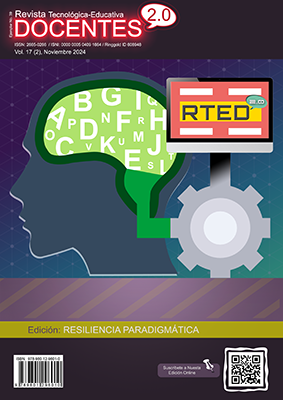Based on Rebecca Oxford's Taxonomy for Strengthening Communicative Skills in English
 DOI:
https://doi.org/10.37843/rted.v17i2.531
DOI:
https://doi.org/10.37843/rted.v17i2.531
Main Article Content
Abstract
English has become an indispensable tool in various areas, such as business, tourism, and education. The central objective of analyzing the incidence of a didactic sequence based on Rebecca Oxford's taxonomy on the communication skills of tenth-grade students of the I.E. Técnico Industrial Laureano Gómez Castro, in the municipality of Aguachica, department of César in Colombia. The proposed methodology was based on an interpretive paradigm, with a qualitative approach of phenomenological design and a method oriented from action research. The data collection techniques and instruments were the diagnostic and final knowledge test, participant observation, field diary, and semi-structured interviews. The results highlight that the design of the didactic sequence mainly benefits those students with a greater interest in foreign languages ??and a higher level of proficiency than their peers. Implementing constant, well-organized, and designed activities based on authentic material was revealed as an effective means to increase the practice of expression and production in English. In short, creating didactic sequences that promote learning strategies and interaction in the target language, using competition and dynamics, motivates students to participate actively. This approach significantly improves both the learning process and the student confidence.
Downloads
Metrics
Article Details

This work is licensed under a Creative Commons Attribution-NonCommercial-NoDerivatives 4.0 International License.
Those authors who have publications in our journal accept the following terms:
- When a work is accepted for publication, the author retains rights of reproduction, distribution of his/her article for exploitation in all countries of the world in the format provided by our magazine and any other magnetic medium, optical, and digital.
- Authors will retain their copyright and guarantee the journal the right first to publish their work, which will be simultaneously subject to the Creative Commons Acknowledgment License (Attribution-NonCommercial-NoDerivatives 4.0 International (CC BY-NC-ND 4.0)). That allows third parties to copy and redistribute the material in any medium or format, under the following conditions: Acknowledgment - You must properly acknowledge authorship, provide a link to the license, and indicate if any changes have been made. You may do so in any reasonable way, but not in a way that suggests you have the licensor's endorsement or receive it for your use. NonCommercial - You may not use the material for a commercial purpose. NoDerivatives - If you remix, transform, or build from the material, you cannot broadcast the modified material. There are no additional restrictions - You cannot apply legal terms or technological measures that legally restrict you from doing what the license allows.
- Authors may adopt other non-exclusive license agreements to distribute the published version of the work (e.g., deposit it in an institutional archive or publish it in a monographic volume) provided that the initial publication in this journal is indicated.
- Authors are allowed and recommended to disseminate their work through the Internet (e.g., in institutional telematic archives, repositories, libraries, or their website), producing exciting exchanges and increasing the published work's citations.
- Request of withdrawal an article has to be done in writing by the author to the Editor, becoming effective after a written response from the Editor. For this purpose, the author or authors will send correspondence via e-mail: [email protected].
- The author will not receive financial compensation for the publication of his work.
- All Docentes 2.0 Journal publications are under the Open Journal System (OJS) platform at: https://ojs.docentes20.com/.
References
Cáceres, F. (2018). Estrategias Para Desarrollar La Expresión Oral A Través De Los Ambientes De Aprendizaje, De Los Estudiantes De Octavo Grado Del Colegio Calasanz De Cúcuta. [Trabajo de Grado, Universidad de Pamplona]. https://n9.cl/1c04w
Consejo de Europa. (2001). Departamento de Política Lingüística. Marco Común Europeo De Referencia Para Las Lenguas: aprendizaje, enseñanza, evaluación. https://n9.cl/nal6qb
Creswell, J. (2014). Research Design, Qualitative, Quantitative, And Mixed Methods Approaches. University of Nebraska. Sage Publication.
Ellis, G., & Sinclair, B. (1989). Learning to Learn English. Cambridge University Press. https://doi.org/10.2307/3586959 DOI: https://doi.org/10.2307/3586959
Escalante, M. (2014). Un Modelo De Desarrollo De Competencias En La Enseñanza Del Idioma Inglés. Revista de Investigación Unmsm. https://n9.cl/8ej7o
García, N. (2018). Estrategias de Aprendizaje de Lenguas Extranjeras en el Aula de Inglés: Propuesta Didáctica [Trabajo de Grado, Universidad de Valladolid] https://n9.cl/klcngv
Hassan, X., Macaro, E., Mason, D., Nye, G., Smith, P., & Vanderplank, R. (2005). Strategy training in language learning - A systematic review of available research. EPPI-Centre. Social Science Research Unit, Institute of Education. https://n9.cl/rngto
Hurtado, D. (2018). Fortalecimiento de las Habilidades Comunicativas en el Idioma Inglés a Través de una Secuencia Didáctica: Un Estudio de Caso en El Valle Del Cauca. [Trabajo de Post Grado]. Universidad Nacional de Colombia.
Oxford, R. (1990). Language Learning Strategies. What every Teacher Should Know. Heinle & Heinle Publishers
Restrepo, B. (2003). Aportes de la Investigación Acción Educativa a la Hipótesis del Maestro Investigador. Educación Y Educadores.
Tapias, E. (2020). Estrategias Lingüísticas Para Fortalecer La Pronunciación En Inglés Y Disminuir La Transferencia Fonética Negativa Del Español Hablado En El Municipio De La Paz, Cesar [Trabajo de Grado] Universidad Pedagógica y Tecnológica de Colombia.
Unesco. (2003). La Educación en un Mundo Plurilingüe. Educación Documento de Orientación. https://n9.cl/2pwo
Vasilachis, I. (2006). Estrategias De La Investigación Cualitativa. https://n9.cl/3j1y






